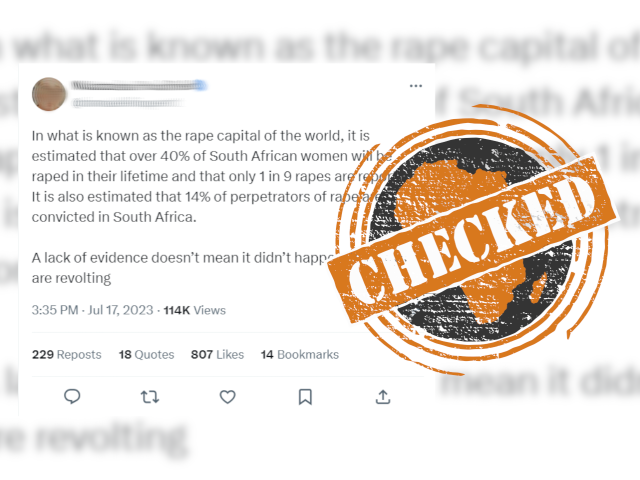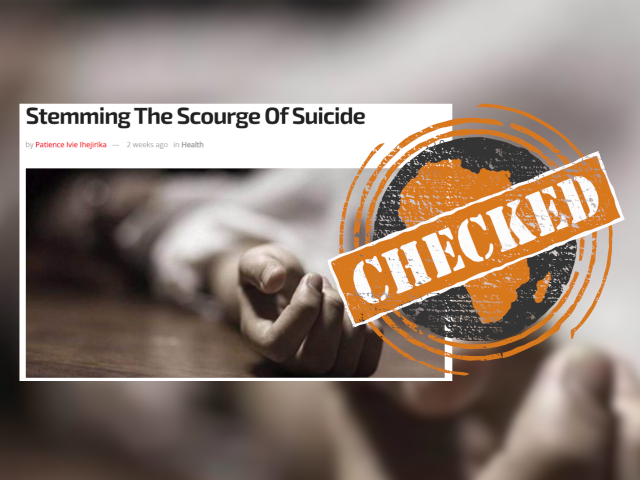Is South Africa the “rape capital of the world”? Do 4% of rape cases end in conviction? And is sex education “non-existent” in South African schools?
These were some of the claims made in an article published online by the Telegraph. (Note: They closely resemble statistics used in an article published in January 2014 on fellow British media group The Independent’s website.)
When the article was first published, Africa Check immediately pointed out that Interpol has never labeled South Africa the “rape capital of the world”. The claim has been circulating since at least 2000 but the organisation, which facilitates international police cooperation, previously told us that “unfortunately these false reports have been repeated by various media, without verification with [Interpol]”.
The claim was then removed without the Telegraph acknowledging the error in the original version.
Sexual violence is one of South Africa’s most pressing issues. Research guide us to possible solutions. Do the Telegraph’s statistics aid in this?
We contacted the journalist and asked for the sources for the rest of her claims. At the time of publishing we had not received a response. If we do, we will update this report.
Rape rate
The South African Police Service’s most recently released crime statistics showed that 46,253 rapes were reported to the police in 2013/14. That year South Africa had an estimated 52.3 million inhabitants which works out to 87 rapes reported for every 100,000 people then in the country.
Figuring out where South Africa ranks globally is harder to do. Statistics on rape in 2013 from the United Nations Office on Drugs and Crime (UNODC) only list 79 countries, most of them in Europe.
South Africa’s rape rate is not included on the list, but it is higher than the top three: Sweden (59), England and Wales (36) and Costa Rica (35).
Differences in how rape is defined internationally, different ways of counting rapes and the number of cases that are not reported to the police make straight comparisons impossible, however.
In England, for example, rape offences are counted according to the number of victims. So if a woman is raped by two men it is recorded as one crime with the offenders acting together. In South Africa, a rape offence should be recorded for every penetration that occurred without the victim’s consent.
Reporting to police
While we know how many rapes were reported in 2013/14, we do not know how many rapes were committed. To get an idea of that you need to research how many rapes were not reported to the police, but there are no such recent studies for South Africa.
South Africa’s 1998 Demographic and Health Survey found that 15.2% of women aged 15-49 - or about one in 7 in this age group - had “sought help” from the police when they were raped.
A 2002 study estimated that only one in nine rapes and attempted rapes were reported to the police. We tried to contact the authors to find out how this figure was calculated and will update the report when we receive clarification.
Guilty verdicts
South Africa’s National Prosecution Authority (NPA) was unable to give us the number of rape cases that ended in guilty verdicts. Instead they provided the conviction rate for all sexual offences for 2014/15, which was 69%.
A conviction rate is the percentage of cases brought to trial that ended in a conviction. For example, 5,484 sexual offences cases resulted in convictions in 2013/14 of the 8,174 cases that went to court, a rate of 67.1% . However, that year there were 62,649 sexual offences cases reported to the police.
The police lump all sexual offences in a broad crime category that includes offences such as rape, sexual assault, bestiality, flashing and public masturbation.
Sanja Bornman, an attorney at the non-profit Women’s Legal Centre, told Africa Check that the organisation had struggled in the past to determine the conviction rate for rape cases.
“It's very difficult to find out how many of the sexual offences convictions were rape convictions. This is because no disaggregated data is made publicly, and readily, available," said Bornman.
Victim blaming
Between 1997 and 2000 CIET, an epidemiological research and training organisation, conducted a survey of 2,059 men and 3,967 women in the south of Johannesburg.
The survey found that 85% of men surveyed said that they remembered someone who had been raped. Of those men, 16% said that they thought the women “asked for it”.
A gender specialist at the Institute for Security Studies, Romi Sigsworth, told Africa Check that the study's findings could not be applied to present-day South Africa.
“This data... is very dated,” said Sigsworth. She added that the findings were about an area in Johannesburg and were not nationally representative of South Africa.
Gang rape
This claim abounds on the internet and the International Business Times and the Mail and Guardian have referred to it, among others. It was reported as early as 1999 by the BBC and The Christian Science Monitor. Africa Check was unable to track down any research that supported the claim, however.
Other researchers have tried to verify the claim before, like Katherine Franks, a cultural anthropologist and sex researcher now at American University. In a book she wrote on group sex Franks noted that the claim “is widely reported… although the original study is elusive”.
Sex education
Sex education is part of the South African school curriculum, which outlines what should be taught in each phase of schooling:
| Grade | Topics included in the curriculum |
| R-3 | Who may or may not touch my body, practising saying ‘no’ and how to report abuse. |
| 4-6 | How to respect others’ bodies, relationships, HIV and AIDS education, gender stereotyping, sexism and abuse. |
| 7-9 | Puberty, HIV and AIDS, sexuality, gender equity, sexual behaviour and sexual health. |
| 10-12 | Reproductive systems, teenage pregnancy, gender roles, stereotyping, risk of pregnancy, sexually-transmitted infections, abuse of power in society (eg. domestic violence, sexual violence and rape). |
Sources: CAPS curriculum grade R-3, CAPS curriculum grade 4-6, CAPS curriculum grade 7-9, CAPS curriculum grade 10-12.
Although sex education is compulsory how, or if, it is taught depends on individual teachers and schools, professor of psychology at Rhodes University and expert on sex education, Catriona Macleod, told Africa Check.
“Gender relations and sexual diversity are also supposed to be covered. However, research shows that teachers are often uncomfortable covering sexuality education and may either avoid it or teach in moralistic ways,” said Macleod.
To prevent this, the department of basic education has “initiated a process of developing scripted lesson plans that lead the teacher through the lesson in a logical and specified way”, their spokesman, Elijah Mhlanga, told Africa Check.
Lifetime risk
The South African Institute of Race Relations’ chief executive officer, Frans Cronje, told Africa Check that he didn’t think the claim originated from the organisation.
“The [Institute of Race Relations] publishes an extraordinary number of documents, articles and publications in any given year… but we cannot place the statistic cited in the Telegraph nor do we have any immediate recollection of having published that statistic in the past,” said Cronje.
There are no recent, nationally representative statistics on the prevalence of rape in South Africa. Lisa Vetten, a researcher specialising in gender violence at the Wits Institute for Social and Economic Research, told Africa Check that the most recent research was from a 2010 survey of women in Gauteng.
It found that a quarter of women aged 18 and older had been raped in their life time. This data, however, does not apply to the whole of South Africa.





Add new comment